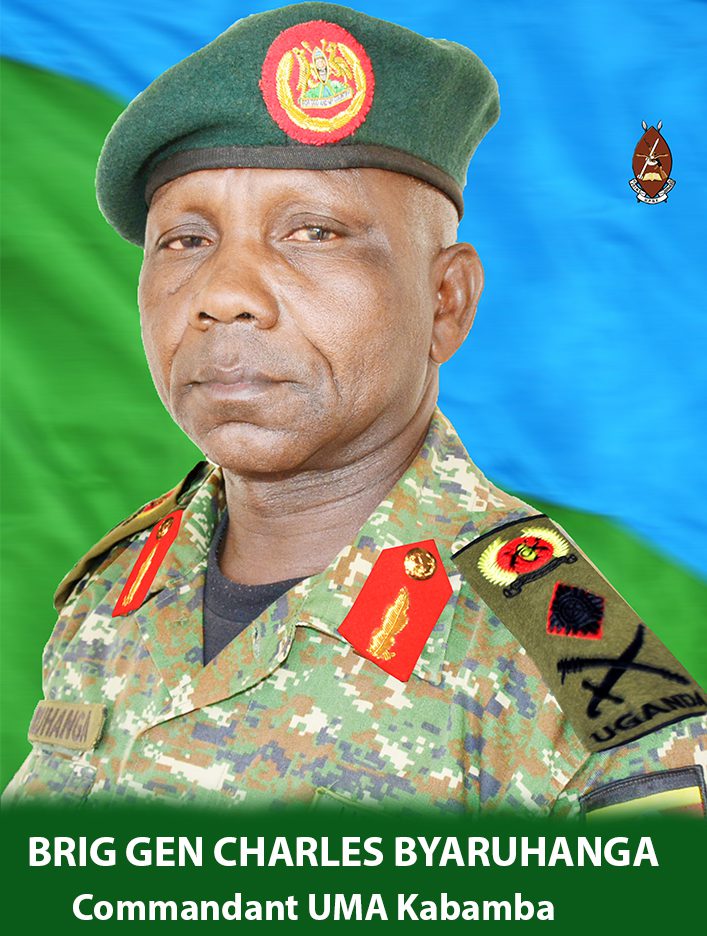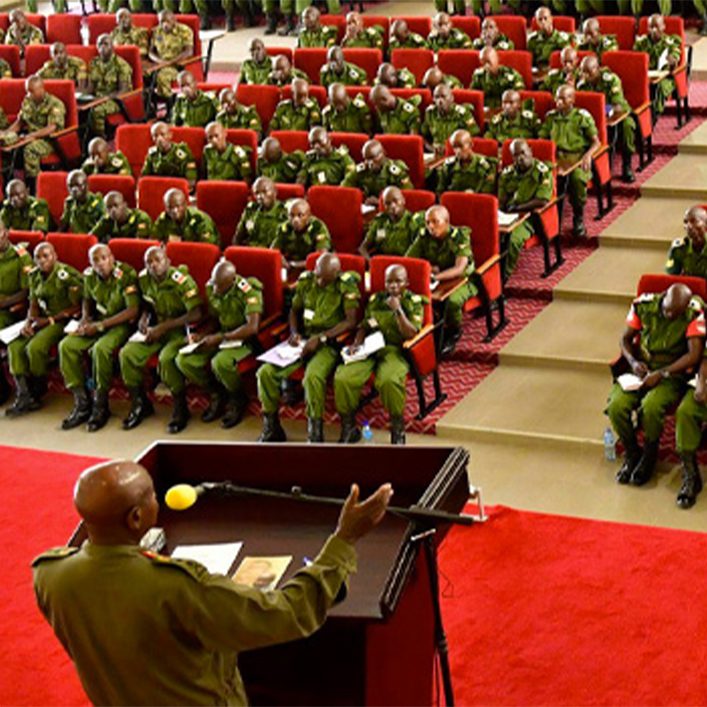The Senior Command and Staff College is located in Kimaka village 3 km on the Jinja - Bujagali road astride the River Nile on the outskirts of Jinja town, 80 km east of Kampala city, in Eastern Uganda. The present site of the college was formerly a residential quarters for the Italian construction company for the construction of the 2nd Hydro electric Dam, but has since been modified to suit the college needs.
History
UMA, KABAMBA, is the UPDF Officer initial training centre. At UMA, UPDF officers are trained to take on the responsibilities of leading soldiers. Most UPDF officers, including late entry officers, who were previously non commissioned officers (NCOS), as well as some officers from Allied countries, in Africa, are trained at UMA.
Uganda Military Academy (UMA) was established in 1962, immediately after independence and 1st Uganda Riffle Battalion was broken down into five companies; A, B, C, D, and Training Company. The training company then created the School Of Infantry (SOI). The main role of SOI, thereafter, was to prepare trainees for the cadet course in Royal Military Academy SAND HURST, for the subsequent two years. In 1964, however, SOI conducted its first Officer Cadet Course. In 1965 SOI started to conduct Younger Officers Course, the Regimental Accounts Course, as well as Drill and Duty Courses.
In 1973, SOI moved its home to KABAMBA, where it stayed until 1979, when it returned to JINJA, after the liberation war. In 2000, SOI was renamed Jinja Military Academy (JMA). In 2005 JMA conducted an Officer Basic Course. In 2006, JMA conducted a Younger Officers Course in BIHANGA and KALAMA. In 2006/07 JMA conducted a Cadet course in BUTIABA.
In November 2007, JMA shifted from JINJA to their present home, KABAMBA in quest for more training space. JMA then came to be known as Uganda Military Academy (UMA) and was mandated to run the Officer Cadet, Platoon Commanders and Officer Basic Courses. To-date, UMA has overseen the running and completion of Eleven Cadet Courses.


- Mission
- Objective
- Vision
- Location
To produce Junior Military leaders who are Robust, Courageous, Honourable, Patriotic, Politically conscious, Informed and well grounded for further professional development.
At the end of the course at UMA, the graduands ought to have been taken through and mastered:
The art of keeping themselves physically fit.
The military theory at elementary level.
The practical conduct of military operations up to company level.
The analysis of the socio – politico – economic history of Uganda, the region, the world and present and possible future trends.
The professional and ethical conduct of honour in the discharge of the public affairs.
The vision of the SCSC is to become an internationally recognized Command and Staff College with full fledged Centers for Strategic Studies and Peace Support Operations.
Past Commandants
Maj Tito Okello Lutwa (Gen RIP)
Col Albert Langoya
Lt Col John Ruhinda Karekona (RIP)
Lt Col James Ssebagala (now Brig)
Maj Gen Andrew Guti (now Lt Gen)
Brig D Wakaalo
Maj Tom Angutoko
Lt Col Isaac Lumago (rtd Gen RIP)
Lt Col Kasirye Gwanga (now Brig)
Lt Col BM Rwehururu (Brig)
Brig CM Kalyebara
Brig E Musinguzi- current
UMA Courses
- Officer Cadet Course
- Platoon Commanders Course(PCC)
- Officers Basic Course(OBC)
The commissioning course is the first stage of officer training and education. Its main purpose is to develop an officer with the generic leadership qualities to lead soldiers both on and off operations. UMA develops leadership in cadets by expanding their character, intellect and professional competences to a level demanded of an army officer on first appointment through military training and education. The core objectives reflected the three key elements in the training and education of young officers: the Moral,the intellectual and the physical
An infantry platoon commander leads soldiers on operations and maintains the platoon’s effectiveness as a fighting unit. He/she commands a rifle platoon of up to 45 soldiers within an infantry battalion, with the help of experience NCO, although the responsibility for its operational effectiveness rests with him/her. There is therefore, the need for majority and sense of responsibility necessary for a role in which soldier’s well being can depend on the out come of his/her decisions.
As part of a larger unit an ability to take orders is essential, but the platoon commander must also be able to act on his/her own initiative if the situation calls for it. In addition, he/she is expected to take an active interest in the welfare of the soldiers and the development of their carriers and will resolve any disciplinary problems within the platoon.
All officers are therefore, expected to master the same basic military skills and tactics as the soldiers they command. This will include drill, basic field craft, map reading, first aid and how to fire and maintain ones personal weapon. In addition to these soldiering skills, one must also learn the skills pertinent to being an infantry officer, and how to command soldiers in the field and barracks through a series on different indoor and field exercises.
Officer Basic Course (OBC) is an infantry course designed for officers who commissioned without undergoing the cadet or any commissioning course. It is now a requirement that all officers in this category must attend this course in order to earn a promotion or prior to their retirement to army. There is no limit on the rank, appointment or age of one in order to attend the course apart from having earned a commission before undergoing a commissioning course.
This course is designed to formally introduce the UPDF infantry doctrine to officers who previously commissioned prior attending any formal officer’s course. The course is almost an abridged cadet package; it however takes into account the fact that the participants all have operational and/or staff experience.
